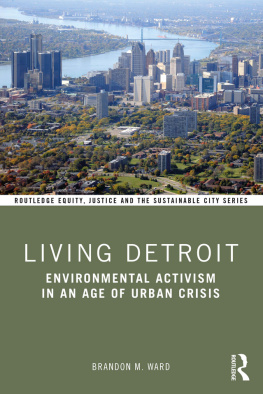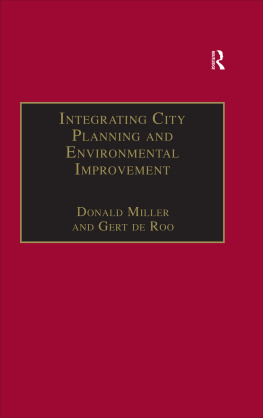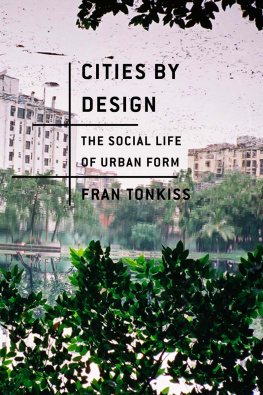Environmental Strategies for Sustainable Development in Urban Areasx
First published 1998 by Ashgate Publishing
Reissued 2018 by Routledge
2 Park Square, Milton Park, Abingdon, Oxon, OX14 4RN
711 Third Avenue, New York, NY 10017, USA
Routledge is an imprint of the Taylor & Francis Group, an informa business
All rights reserved. No part of this book may be reprinted or reproduced or utilised in any form or by any electronic, mechanical, or other means, now known or hereafter invented, including photocopying and recording, or in any information storage or retrieval system, without permission in writing from the publishers.
Notice:
Product or corporate names may be trademarks or registered trademarks, and are used only for identification and explanation without intent to infringe.
Publishers Note
The publisher has gone to great lengths to ensure the quality of this reprint but points out that some imperfections in the original copies may be apparent.
Disclaimer
The publisher has made every effort to trace copyright holders and welcomes correspondence from those they have been unable to contact.
ISBN 13: 978-1-138-33878-4 (hbk)
ISBN 13: 978-0-429-44144-8 (ebk)
Christian Arandel is Program Advisor at Environmental Quality International-EQI, a leading private consulting firm in Egypt. He manages the Urban Management Program, a joint UNDP-UNCHS- World Bank initiative, in the Arab States Region.
Carl R. Bartone is Principal Environmental Engineer at the Urban Development Division of the World Bank, based in Washington, DC. Prior to joining the Bank in 1986, he spent 15 years working in Latin America as regional pollution control advisor and technical director of the Pan-American Center for Environmental Engineering-CEPIS in Lima, Peru.
Jochen Eigen is the Coordinator of the Sustainable Cities Program of the UN Center for Human Settlements and the UN Environment Program, based in Nairobi, Kenya. He also coordinates the Environmental Component of the Urban Management Program.
Edesio Fernandes is Senior Research Fellow at the Institute of Commonwealth Studies of the University of London. His research interests include urban and environmental planning, policy and legislation in developing countries.
Herbert Girardet, a UN Global 500 Award recipient, is a film-maker and writer; he is the author of The Gaia Atlas of Cities and co-author of Making Cities Work. He is Visiting Professor for Environmental Planning at Middlesex University, London, and Chairman of the Schumacher Society in the UK.
Leonardo Martnez-Flores works at the Instituto Nacional de Ecologa in Mexico City, and is directly involved with the formulation and implementation of the Air Pollution Program.
Janice Perlman, a Kennedy Professor of the University of California at Berkeley, is the founder and Board President of the Mega-Cities Project, which is a transnational non-profit network created in New York in 1987, dedicated to transferring innovative solutions to common problems between the worlds largest cities.
Jonas Rabinovitch is the Manager of the Urban Development Team of the United Nations Development Program, based in New York. He worked for the Curitiba Research and Urban Planning Institute for many years.
Bolivar Ruiz-Adaros is the Regional Director of the National Commission for the Environment-CONAMA in the Bio Bio Region, Chile; he is also a lawyer and Lecturer in Environmental Law at the University of Concepcion, in Chile.
David Satterthwaite is the Director of the Human Settlements Program at the International Institute for Environment and Development, based in London, and Editor of the Journal Environment and Urbanization.
Vuyiswa Tindleni is a member of the Green Coalition, from Cape Town, South Africa. The Green Coalition is an alliance of over forty NGOs which have been working closely together with the Cape Town City Council on several issues regarding sustainable development.
This book contains a selection of the papers presented at the International Conference Environmental Strategies for Sustainable Development in Urban Areas: Lessons from Africa and Latin America, which was jointly promoted in September 1996 by the Institute of Commonwealth Studies-ICS and the Institute of Latin American Studies-ILAS of the University of London. Special thanks are due to all those who accepted the invitation to present papers at the Conference and thus to share their valuable experience with the other speakers and participants: Christian Arandel, Martha Banuelos, Carl Bartone, Jochen Eigen, Herbert Girardet, Mohamed Halfani, Patricia Iturregui, Davindar Lamba, Leonardo Martnez-Flores, Alexandrina Sobreira de Moura, Janice Perlman, Jonas Rabinovitch, Bolivar Ruiz-Adaros, David Satterthwaite and Vuyiswa Tindleni.
At the ICS, I would like to thank Professor James Manor, Ms. Sonja Jansen and Ms. Rowena Kochanowska for their support and help. At the ILAS, I would like to thank Professor Victor Bulmer-Thomas for his encouragement.
I am especially indebted to the Citicorp Foundation and to numerous Citibank branches in Africa and Latin America for their generous grants, which made the Conference possible; I would especially like to thank Mr. Peter Thorpe, Mr. Robert Annibale and Ms. Kathryn Carassalini. Finally, I am also very grateful to Ms. Mira Knezevic and Mr. Pedro Alves for their help with the preparation of the manuscript.
Edesio Fernandes
Introduction
The rapid urbanization in African and Latin American countries throughout this century has provoked all sorts of drastic social, economic and cultural changes, which have already been discussed extensively. Equally well known are the long standing technical, financial and political problems and constraints confronting the governments of those countries in their attempts at promoting economic development and controlling urban growth.
Special emphasis has been placed, since the 1980s, on the complex nature and implications of the processes of (re)democratization and decentralization in Africa and Latin America. The research on the reform of the state in those regions has been combined in recent years with a discussion on the conditions and consequences, for the national economies, of structural adjustment, liberalization and privatization policies imposed by international donors and multilateral financial institutions, within the context of the current process of economic globalization.
However, although the pace and the pattern of overall development in Africa and Latin America has also brought about major environmental changes, the existing research on the environmental realities in those regions is still incipient, particularly as regards the urban environment. In fact, most of the interest in, and knowledge on, environmental matters seems to focus primarily on issues concerning wildlife or the great ecosystems such as the Amazon, while the understanding of the environmental dimension, and resulting problems, of the process of intensive urban growth is still fragmented. Moreover, as Satterthwaite argues in , the research agenda on environmental matters in cities in the South has been determined, to a large extent, by the values, concerns and interests of more developed countries in the North.





